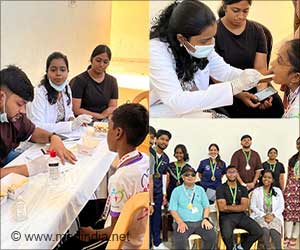Hundreds of human body parts, supplied by a North Carolina body parts broker, were recalled by a leading medical firm. These tissues are supposed to have a tainted history. The products from that company were intended for transplant throughout the country!
A Raleigh funeral home director reported on Tuesday that unsterile preservation room was used by the broker to cut several corpses to obtain the tissue.The body broker was shut down by the U.S. Food and Drug Administration on Friday. However, they refuse to speak on how many people could have received potentially risky tissue.
The flourishing tissue transplant industry has witnessed the second scandal within a year.
More than a million transplants are done every year, using corpse tissue, in common operations like back surgery and knee repairs. A three-month Associated Press investigation found earlier this year that though cadaver tissue is very beneficial, it is not being regulated properly.
Infections like hepatitis, AIDS and even death can be caused by improperly handled or poorly tested tissue. A scandal was reported last year. In that, Biomedical Tissue Services, a New Jersey company was accused of using stolen bodies and of shipping nearly 20,000 potentially tainted body parts.
The North Carolina incident was not revealed till late last Friday by the federal authorities, when they closed down the Donor Referral Services of Raleigh, N.C. According to the FDA, Philip Guyett’s company had "serious deficiencies" in its processing, donor screening and record keeping. He was accused, by the government, of changing records to overlook such problems as cancer or drug use by the dead donor.
Advertisement
Guyett, 38, was not available for comment. The Associated Press were told on Tuesday by the 2 companies that had business dealings with Guyett, that they knew of at least 60 bodies cut up and at least 300 body parts that were recalled. They revaled that Guyett had other business associates also.
Advertisement
It is still too early to measure the impact of the Guyett tissue scandal. There was no comment on the recall or the number of body parts involved, by the FDA spokeswoman Julie Zawisza.
"In specific instances where information has raised concerns about patient safety, FDA has worked with the firm that distributed the subject tissue to ensure that physicians are notified to inform patients and offer testing," Zawisza said an e-mail to The Associated Press.
According to Tipton Ford, chief of a company whose tissue transplant business was recently acquired by AlloSource, Guyett had supplied tissues from 19 donor bodies to Allosource from 2002-2004. However, this account is just a small part of Guyett's business. According to Larry Parker, president of Cremation Society of the Carolinas, a Raleigh funeral home, he was paid $1,000 by Guyett for each of the approximately 60 donors the funeral home referred. Parker began his dealings with Guyett in 2004, he believe that Guyett had business with other funeral homes too.
"He did the recovery in our facility, in the embalming room. It is not a sterile facility. It was not built for tissue recovery," said Parker, adding that he has been working with the FDA since the agency contacted him several weeks ago.
The American Association of Tissue Banks, an industry group, has given a given detailed standards on how tissue must be procured and processed under sterile conditions to avoid spreading infection to recipients. However, it is not compulsory for the tissue banks to belong, and Guyett and his company did not.
Guyett already has a felony conviction from a previous tissue scandal in California.
According to Jane Robison, spokeswoman for the Los Angeles County District Attorney's office, a Philip Guyett with the same date of birth and other records that match the body broker in Raleigh pleaded no contest to a felony, embezzlement stemming from the willed body program he directed at an osteopathic college in Pomona, Calif., in the late 1990s. Subsequently, two other criminal charges were dropped, she said.
Guyett had been accused of selling a corpse to another school and keeping the payment of $1,100. The warehouse, that he used, was raided by police and 3 freezers with human heads and hearts were found.
According to Robison, Guyett was fined and sentenced in April 2000, ordered to perform six months of community service and was given three years' probation.





